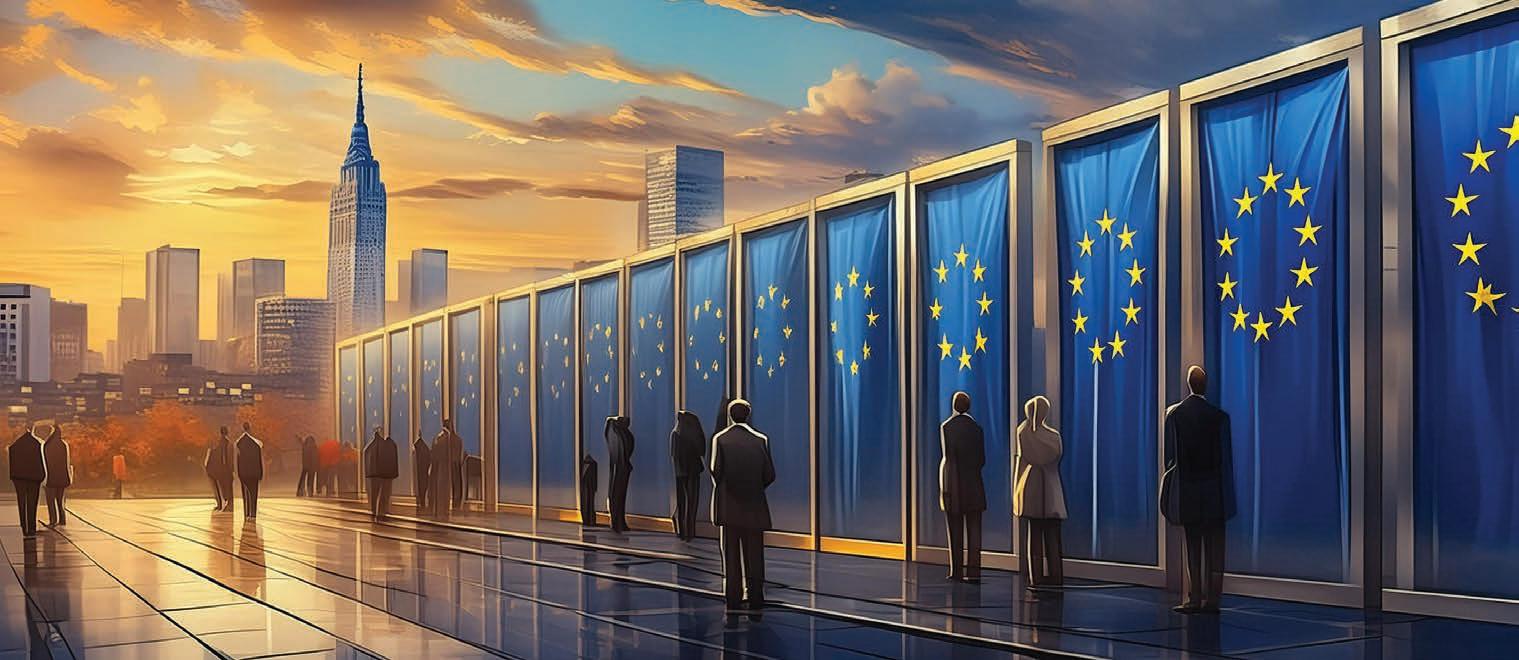
4 minute read
April 2024 Special Edition
THE COUNTDOWN BEGINS
A PREVIEW OF THE 2024 EUROPEAN PARTIES
As the calendar pages turn towards June 6-9, 2024, the political landscape of Europe is buzzing with anticipation. The upcoming elections to the European Parliament are set to be a pivotal moment in determining the future direction of the European Union (EU). With the continent’s political, economic, and social fabric increasingly interwoven, the stakes have never been higher. At the heart of the electoral battle are several key parties, each with its vision for the future of Europe:
European People’s Party (EPP)
Leading the charge is the European People’s Party (EPP), a bastion of center-right politics in the EU. Known for its commitment to market-oriented economic policies, social conservatism, and European integration, the EPP has historically been a dominant force in the Parliament. As the 2024 elections approach, the party is rallying its base with promises of economic stability and security amidst global uncertainties.
Party of European Socialists (PES)
On the other side of the political spectrum, the Party of European Socialists (PES) is positioning itself as the champion of the working class and advocate for social justice. With a platform centered around fair wages, workers’ rights, and a robust social safety net, the PES is appealing to voters disillusioned by economic disparities and seeking a more equitable Europe.
Alliance of Liberals and Democrats for Europe Party (ALDE)
The Alliance of Liberals and Democrats for Europe Party (ALDE), currently as “Renew Group” continues to make the case for a liberal and progressive Europe. Emphasizing individual freedoms, human rights, and a strong stance on environmental sustainability, ALDE is courting the centrist and progressive vote, aiming to bridge the gap between the left and right.
European Democratic Party (EDP)
The European Democratic Party (EDP) stands out with its centrist, pro-European stance, advocating for a “United in Diversity” Europe. The EDP is focusing on strengthening European democracy, fostering economic growth through innovation, and supporting small and mediumsized enterprises (SMEs).
European Green Party
The European Green Party is riding a wave of increased environmental awareness, pushing for aggressive action on climate change, sustainable development, and green jobs. With the climate crisis at the forefront of many voters’ minds, the Greens are poised to make significant gains in the upcoming elections.
European Free Alliance (EFA)
The European Free Alliance (EFA) gives a voice to Europe’s regions and minority groups, advocating for selfdetermination, cultural preservation, and regional autonomy. In a union often dominated by larger member states, the EFA seeks to ensure that all voices are heard.
Identity and Democracy Party
The Identity and Democracy Party, evolving from the Movement for a Europe of Nations and Freedom, represents the nationalist and eurosceptic flank of European politics. With a focus on national sovereignty, border control, and skepticism towards EU integration, the party aims to reshape Europe’s approach to governance and migration.
European Conservatives and Reformists Party (ECR)
The European Conservatives and Reformists Party (ECR) brings a conservative and reformist agenda to the table, advocating for a decentralized EU, economic freedom, and conservative social values. The ECR challenges the status quo, calling for significant reforms in how the EU operates.
Party of the European Left
The Party of the European Left unites various left-wing parties and movements across Europe, championing social equality, workers’ rights, and anti-austerity measures. In the face of rising inequality, the party seeks a radical transformation of European society.
European Christian Political Movement (ECPM)
Finally, the European Christian Political Movement (ECPM) represents a unique blend of Christian democratic, social conservative, and pro-life policies. The ECPM emphasizes the importance of Christian values in shaping European policies and society.
Will there be any new parties?
This is something we will probably learn in the coming weeks, but for the moment that is what we have.
As Europe stands at a crossroads, the 2024 European Parliament elections present a crucial opportunity for voters to decide the continent’s future. With a diverse array of parties vying for influence, the outcome will undoubtedly have a lasting impact on the direction of the European Union and its role on the global stage. ■

